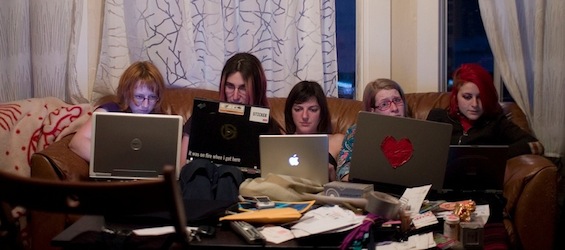As Not Seen on TV
 There are rules. Unspoken, but there nonetheless. Cell phones are silenced and out of sight. Laptops are used only during commercial breaks. Screaming, crying, and handholding are allowed; talking is not. When the TV credits roll, take to the internet. Within seconds, there are shrieks of outrage or tears of joy. The reblog button is in frequent use. The quotes, screen caps, and clever jokes follow. The fanfiction begins.
There are rules. Unspoken, but there nonetheless. Cell phones are silenced and out of sight. Laptops are used only during commercial breaks. Screaming, crying, and handholding are allowed; talking is not. When the TV credits roll, take to the internet. Within seconds, there are shrieks of outrage or tears of joy. The reblog button is in frequent use. The quotes, screen caps, and clever jokes follow. The fanfiction begins.
Fanfiction is a collection of stories based on books, movies, or TV shows. “I crank out a post-ep, usually based on whatever stood out to me for my favorite character during the episode,” explains Glee fan Kasey. “It usually takes me no more than half an hour; meanwhile, my partner is spending all night on Tumblr debating and arguing and meta-ing with other fans.” This is fandom in action, a worldwide fan collective.
Fanfiction is not a new phenomenon; the internet just makes it easier to publish and find. It originated with sci-fi “fanzines” in the 1930s as generic fan-written stories. Thirty years later, Star Trek-based Spockanalia developed a new form. Amateur press associations printed and sent the magazine to friends of friends. The magazine featured fan art and stories about the romantic relationship between Captain Kirk and his half-Vulcan First Officer Spock. The stories ranged in genre and rating, from touching domestic scenes to graphic sex scenes. Since then, few topics have been left untouched. Male pregnancy is fairly common in some internet groups. Incest isn’t out of the question either, nor is “twincest” (or Wincest for the viewers of the show Supernatural). Alternate universes and crossing two fandom worlds usually bring interesting results, such as the now cliché but still entertaining idea of taking a cast out of their world and putting them in Hogwarts. There are stories that closely follow the original work by filling in the plot holes and missing scenes, or simply giving more back story to characters. There are swoon-worthy romances, heartbreaking dramas, and comedies that make the reader laugh until they’re “kinda clapping like a demented seal” as one reader eloquently put it.
The opportunities to read these stories have expanded. LiveJournal, Tumblr, and Archive of Our Own are all excellent fanfiction websites for any fandom. FanFiction.net shows a myriad of sizes with totals spanning from a single story to even half a million in a fandom. Some sites, like harrypotterfanfiction.com, specialize in a single fandom to consolidate the collection of stories and to make them easier to find. Others focus on a single couple, like scarvesandcoffee.net, which only provides stories about Kurt and Blaine from Glee.
Nickie Vogt, an enthusiastic fan of many shows and books, takes pride in her appearance, wearing floral skirts and cardigans with her hair always curled. But none of that matters when her laptop is on her stomach and there’s post-episode fanfiction to be read. The television is on with Victorious finishing. She scrolls through pages of tags on Tumblr, laughing, fuming, and occasionally reading things out loud. The episode she just watched directly sets her mood for the type of fanfiction she wants to read. Happy episodes result in happy thoughts and stories, but for every up, there is a down. “When an episode goes badly for me, I go into what I call mass hysteria mode where I believe there will never be light again in my life, that my lungs are being collapsed, that my heart’s going to speed up so much that it’ll eventually just burst out of my chest and I will die,” she explains from her orange, dorm room couch. She exhibited those feelings earlier when her favorite couple (on Victorious) Jade and Beck broke up. “And if there’s no promo letting me know that things are gonna get better; I might as well just curl up in a ball on the floor.”
Nickie fully acknowledges that she’s a drama queen, but these strong, almost violent, emotions are common among most in fandom. It’s what separates fandom from simply being a fan. As Supergreak, a reader on the website LiveJournal, puts it, “A fan is passive. They’ll turn on a show while they’re washing dishes and like it, might even watch it loyally or whatever. But someone in fandom is active. They discuss, theorize, write, read, draw, comment, have opinions.” Those in fandom’s global community are involved with the material. Not satisfied with the televised show, they create something from songs to pictures to stories.
Fandom is a direct product of fanfiction. At first glance, a fanfiction community looks like a bunch of people sharing stories on the internet. A closer look reveals a community with a basis of merit, worth, and self-esteem. Good writers receive praise and are encouraged to continue, while developing writers receive critiques and are encouraged to grow.
An entire sublanguage originated among the denizens of the internet. Some people identify themselves as lurkers or betas (editors). Ship wars (fights about couples) are constantly waged, with each side defending, sometimes violently, their OTPs (One True Pairing). Squees, snorffles, and glomps are all acceptable expressions of praise. Crack and fluff are genres, and the romantic pairings are denoted by the words slash, femmeslash, het, and gen. Many of these are onomatopoeias and abbreviations, which allow for fast and accurate responses that keep with the mostly light-hearted love for the canon. Even fanfiction is often abbreviated fanfic or fic. It’s easy to distinguish fandom veterans from noobs by casual use of and response to this jargon.
Beyond the language, a trade economy cropped up. Karen Hellekson noted in Cinema Journal that gift trading is the “centerpiece of fandom,” with videos swapped for mixed albums, fan art, and vice versa. The online Big Bang festivals thrive on this interaction, starting with one form of art - be it story, picture, or music - and using volunteers to build a multimedia package complete with any number of things: text story, illustrations, photo manipulations, soundtracks, video trailers, and even the occasional t-shirt design. Big Bang, Baby Challenge, the original Big Bang Festival, is a 2005 invitation-only exchange centered on Harry Potter and Draco Malfoy. Authors were told to write stories of a least 50,000 words – only four completed the pieces. These were submitted to the group moderators, who sent them to the artists. Artists turned in any number of illustrations inspired by the stories, and all material was posted online for the fandom to see. Since then, changes have been made. Minimum word counts vary from 10,000 to 100,000. Some challenges begin with art and have stories written for it; one new group even starts with a playlist.
Fandom is not entirely self-serving either. Communities such as help_haiti auction off custom fanworks for money which helps rebuild places suffering from natural disasters. They raised over $100,000 in a year for Haiti assistance. These exchanges are growing in popularity. A new exchange comes up with each natural disaster.
Even on a basic level, there is an exchange in each fanfic’s reading. The reader gets a story for some entertainment while the writer has one more person who can talk about his work. It’s common courtesy for the reader to leave a review, anything from a critique on style and character to a general love for the story. An anonymous review left on the Glee fic “Fathers” exemplifies this. “It's 2am and everyone else in the house is asleep and I'm sitting in the dark in my bed reading this and tearing up because it's just so beautiful. This is what you've reduced my evening to, and I can't think of a better way to have spent it.”
There are threats to fanfiction, especially copyright laws. Most writers use a disclaimer reminding the reader they do not have rights to the characters or world they are using which satisfies most copyright holders. Some professional writers, like Orson Scott Card and Anne Rice, ask their fans not to write fanfiction, claiming they don’t want people skewing the view of their characters. These requests are respected most of the time, not counting the fanfiction that never reaches the internet. Other times, authors encourage fanfiction, such as JK Rowling. Although they say it’s because they are happy to let others play in their world, it is possibly a marketing ploy.
Fandom provides a safe haven for all. Some fans turn to fanfiction in tough times. Deanna, an inactive writer, though active reader, claims, “It’s one of the only things that helps me when I’m horribly stressed. Escape for a few moments as I do with books.” For others, it’s a place to hone writing skills and grow as an author. One anonymous follower of the Puckurt community of LiveJournal explains, “Fanfiction led me to LiveJournal then later Dreamwidth where I discovered a whole new world, made all sorts of friends, got new skills and learned a lot of things about myself I didn't know. It's still a great way to meet new people and make connections.” Some even use fanfiction to learn English, like one LiveJournal reader, Maria. She now offers services as a translator from English works to Italian. The most universal aspect, as Samantha put it, “It’s just really freaking fun.”
Although it doesn’t happen as often as I want I write fanfiction. The ideas for my own stories come from anywhere, either the source material itself or random occurrences in my life. A throw-away line about a photo lineup in a book becomes a love story. A misheard lyric from a song turned into a drunken rant to God from a man who just lost his brother. The ramblings of a sleep-deprived road trip with two of my best friends created a short story whose climax was, “Jared lifted the gun again and shot five marshmallows square into Chad’s chest.” Characters are placed into Shakespearean plots at the whim of a friend. Recent daydreams inspired a story that found the perfect set of characters. It’s about telling this story through whatever means necessary.
Nickie, still slumped on the couch four hours after her show ended, refuses to leave her laptop. Her hair, carefully curled that morning, has fallen, not that she notices. Her eyes keep running over the Victorious fanfiction that fixes the break-up scene between her favorite couple, despite the gathering tears. “I can’t always go out of my way and call my best friend and freak out over a show, but I know I can always go to my Tumblr and freak out about it,” she explains. “Fandom’s just in my life; it’s a part of my life.”
For many, this is the importance of fandom. It’s a worldwide club full of people they’ve probably never met. “It’s not just a bunch of people freaking out about a show or freaking about characters or a book or anything. It’s kind of a place where a bunch of people feel like they connect to something, can all connect together.” Nickie switches tabs and refreshes the page, automatically reading the new updates. “You can’t spazz out in real life without people staring at you and judging you, but you can spazz out on the internet and you’ll get likes and reblogs and followers. It’s a place where your passion is kind of accepted.”
